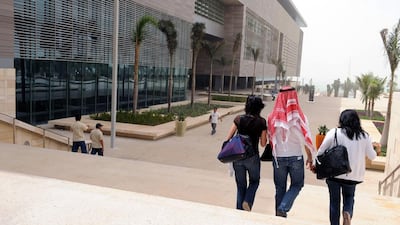The Saudi education system has many problems, some of them endemic. Whenever issues such as unemployment or terrorism are examined, Saudi education and its future becomes the focus for observers. And yet education is a key area of concern for the kingdom, even if we were only to go by the size of the ministry of education. With more than 500,000 teachers, it is the country’s third largest employer after the ministry of defence and the ministry of interior. It oversees a sprawling network of 25 public and 27 private universities and about 30,000 schools. Clearly, this ministry is central to the kingdom’s future. But its report card leaves much room for improvement.
The focus has long been on the curriculum, right from 1954, when the education ministry was established. There is a continuing debate about the emphasis on religion and languages at the expense of science and mathematics. Many Saudis see their education system as affected by political currents, with senior scholars fiercely shielding the curriculum from those who want to bring about change. There is a particular watchfulness towards a colloquial term “awakening” in reference to political Islam because this is seen as the cause of extremist tendencies. Unfortunately, this never-ending cycle of debate delays progress on the necessary curriculum changes. Until this matter is resolved, there will be discontent within the education system.
But the curriculum is not the only issue. Dilapidated school buildings, inadequate teachers’ salaries and long school holidays are problems too.
There is a perception that the lack of good teachers will result in students failing to get even a basic education, but who will still go on to university. This, many Saudis fear, will perpetuate the problem because these university students will get hired to work in the education sector and so the cycle will continue.
The education system is stagnating, producing graduates who do not meet international standards of excellence. This is why the kingdom’s teachers are required to take proficiency tests and complete training courses although there is no set schedule for these exercises. But it may take a generation at the very least to rectify the situation.
Another problem is the number of places in higher education, especially in the natural sciences. Students are usually poorly qualified on entry despite a high grade point average. They are competent up to a point but they are not used to questioning, show a preference for rote learning, take longer than they should to complete a task and can cope with specific numerical routines but not problem solving. These factors illustrate a gap between two cultures: the school versus university ethos.
Some factors that feed into this include studying in English, a lack of personal commitment to college education and inadequate study skills. The issue of studying in English is significant because physics, chemistry and biology traditionally use English as the basic language that directs approach, methodology and analysis. Although Saudi students may receive Arabic versions of the English text, some concepts do not translate well and the student can fall behind quite quickly.
Add to this the lack of commitment to a college education and it becomes clear that even the minimal time invested by a young person in their studies may go to waste. Often, this is because of the pull of traditional family values, which mean the student is obliged to put family before higher education.
The 2011 Nitaqat Law making Saudisation of the workplace mandatory is greatly affected by the human capital “output” from the kingdom’s education system. The fact that Nitaqat requirements need to be met means that employers will hire not who they need but those who will enable them to fill quotas to receive the maximum benefits allowed by the system. But for anything to change, it is Saudi employers who need to recognise that they are jeopardising the kingdom’s future by hiring employees who cannot do their job.
It seems that Saudi students are also frustrated by the current system. The common reasons cited by students who drop out of their first year in a Saudi university are the lack of information about what the degree programme involves, opportunities available for training in the relevant sector and typical employment opportunities.
Hundreds of thousands of Saudis have gone to universities in the United States and Europe to avoid the frustrations of the system in the kingdom. Abroad, they actually learn to analyse using rigorous methods and are able to play important parts in a knowledge-based society. However, overseas study may cause many of them to develop lives away from the kingdom, a phenomenon that the late King Abdullah referred to as “the Saudi brain drain”.
He called for their return to help fix the country’s troubles across many sectors of the economy but this did not produce many results.
Overall, the Saudi education system needs to be overhauled urgently. There are internal pressures and the urgent requirement to produce the best and brightest at home. Time is not on Saudi Arabia’s side.
Dr Theodore Karasik is an analyst on the Gulf, specifically the kingdom of Saudi Arabia. He is based in Dubai

